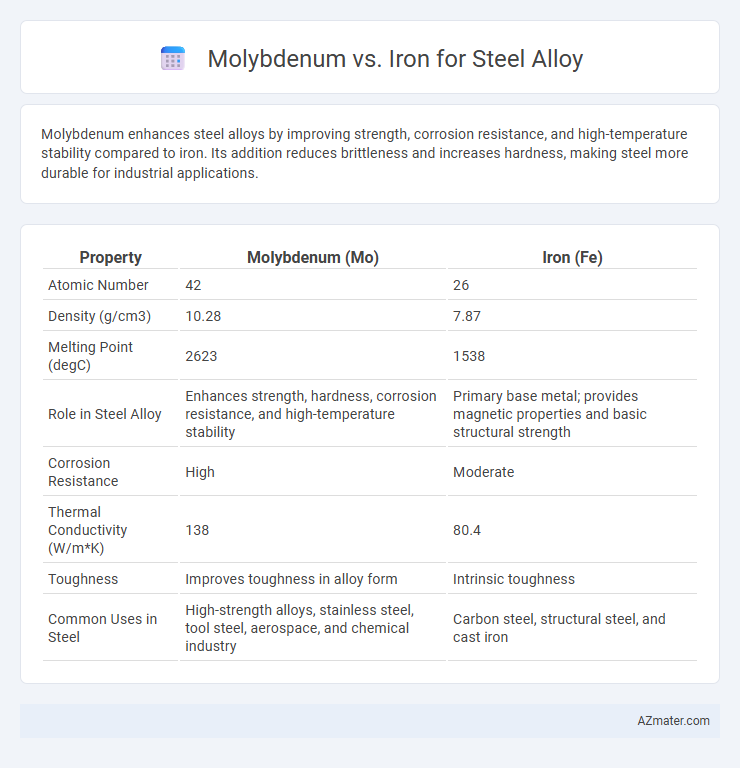Molybdenum enhances steel alloys by improving strength, corrosion resistance, and high-temperature stability compared to iron. Its addition reduces brittleness and increases hardness, making steel more durable for industrial applications.
Table of Comparison
| Property | Molybdenum (Mo) | Iron (Fe) |
|---|---|---|
| Atomic Number | 42 | 26 |
| Density (g/cm3) | 10.28 | 7.87 |
| Melting Point (degC) | 2623 | 1538 |
| Role in Steel Alloy | Enhances strength, hardness, corrosion resistance, and high-temperature stability | Primary base metal; provides magnetic properties and basic structural strength |
| Corrosion Resistance | High | Moderate |
| Thermal Conductivity (W/m*K) | 138 | 80.4 |
| Toughness | Improves toughness in alloy form | Intrinsic toughness |
| Common Uses in Steel | High-strength alloys, stainless steel, tool steel, aerospace, and chemical industry | Carbon steel, structural steel, and cast iron |
Introduction to Alloying Elements: Molybdenum vs Iron
Molybdenum enhances steel alloys by improving strength, corrosion resistance, and high-temperature performance, while iron serves as the primary base metal providing fundamental structural properties. In alloying, molybdenum contributes to hardenability and toughness, particularly in stainless and tool steels, whereas iron's role is to form the essential matrix for alloying elements. Understanding the distinct effects of molybdenum and iron is crucial for optimizing steel compositions in various industrial applications.
Chemical Properties and Role in Steel
Molybdenum enhances steel's chemical properties by increasing corrosion resistance, strength, and toughness due to its high melting point and resistance to oxidation. Iron, as the base element, provides fundamental structural integrity but lacks the alloying benefits that molybdenum adds, such as improved hardenability and resistance to wear at high temperatures. Molybdenum's ability to form stable carbides significantly refines grain structure, which optimizes the steel's mechanical performance compared to iron alone.
Impact on Mechanical Strength
Molybdenum significantly enhances the mechanical strength of steel alloys by increasing hardenability and resistance to softening at high temperatures, which improves toughness and tensile strength. Iron, as the primary base metal in steel, provides fundamental structural integrity but lacks the alloying capabilities to boost strength and wear resistance independently. The addition of molybdenum to iron-based steels results in superior performance under stress, fatigue, and impact compared to iron alone.
Corrosion Resistance Comparison
Molybdenum significantly enhances corrosion resistance in steel alloys by improving resistance to pitting and crevice corrosion, particularly in chloride-rich environments, outperforming iron in durability and chemical stability. Steel alloys containing molybdenum exhibit superior performance against acidic and oxidizing conditions, which is critical for marine, chemical processing, and industrial applications. Iron, while foundational to steel, lacks the inherent corrosion resistance properties that molybdenum imparts, making molybdenum-enriched steel alloys more reliable for long-term exposure to corrosive agents.
Influence on Hardness and Toughness
Molybdenum significantly enhances steel alloy hardness and toughness by refining grain structure and increasing resistance to wear and abrasion, making it crucial for high-strength applications. Iron, as the base metal, provides the foundational matrix but lacks the alloying benefits that improve hardness and toughness on its own. The addition of molybdenum contributes to better hardenability and improved performance under high-temperature conditions compared to iron-based alloys without it.
Effect on Weldability and Machinability
Molybdenum enhances steel alloy weldability by improving high-temperature strength and reducing the risk of cracking in welded joints, making it ideal for applications requiring durability under stress. Iron-based alloys with high iron content may exhibit lower weldability due to increased brittleness and susceptibility to heat-affected zone cracking. Molybdenum also improves machinability by promoting finer grain structure and better chip formation, whereas pure iron alloys often face challenges like work hardening and poor surface finish during machining processes.
Cost and Availability in Industry
Molybdenum significantly increases the cost of steel alloys due to its higher market price compared to iron, impacting overall production expenses in the steel industry. Iron is abundantly available and widely used as the primary base metal in steel manufacturing, ensuring lower material costs and easier procurement. The choice between molybdenum and iron depends on balancing cost-effectiveness with desired mechanical properties and corrosion resistance in industrial applications.
Applications in Different Steel Grades
Molybdenum enhances steel alloys by improving hardness, corrosion resistance, and high-temperature strength, making it ideal for stainless steels and high-speed tool steels. Iron remains the primary base metal, while molybdenum's addition is crucial in grades like AISI 4140 and 316 stainless steel, where enhanced toughness and resistance to wear are required. The combination optimizes steel performance in automotive, aerospace, and construction applications, differentiating steel grades by their specific alloying elements.
Environmental and Safety Considerations
Molybdenum-enhanced steel alloys offer superior corrosion resistance and higher strength at elevated temperatures, reducing the need for frequent replacements and minimizing environmental waste compared to iron-based alloys. The extraction and processing of molybdenum involve lower greenhouse gas emissions per unit of strength provided, leading to a smaller carbon footprint in steel production. Safety considerations also favor molybdenum alloys as they provide improved structural integrity under extreme conditions, reducing the risk of material failure and associated hazards in industrial applications.
Future Trends in Steel Alloy Development
Molybdenum is increasingly favored in steel alloys for its superior high-temperature strength, corrosion resistance, and creep resistance compared to iron, which primarily serves as the base metal. Future trends in steel alloy development emphasize enhancing performance for extreme environments, driving the integration of molybdenum to improve durability and mechanical properties. Advanced alloy formulations leverage molybdenum's ability to refine grain structure and stabilize phases, aligning with industry demands for more resilient, lightweight, and sustainable steel products.

Infographic: Molybdenum vs Iron for Steel Alloy
 azmater.com
azmater.com